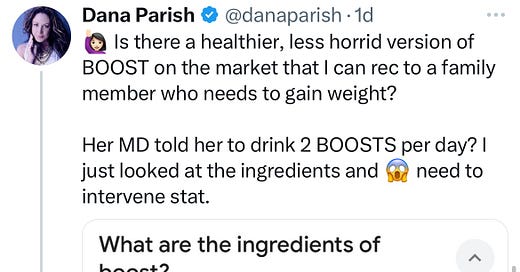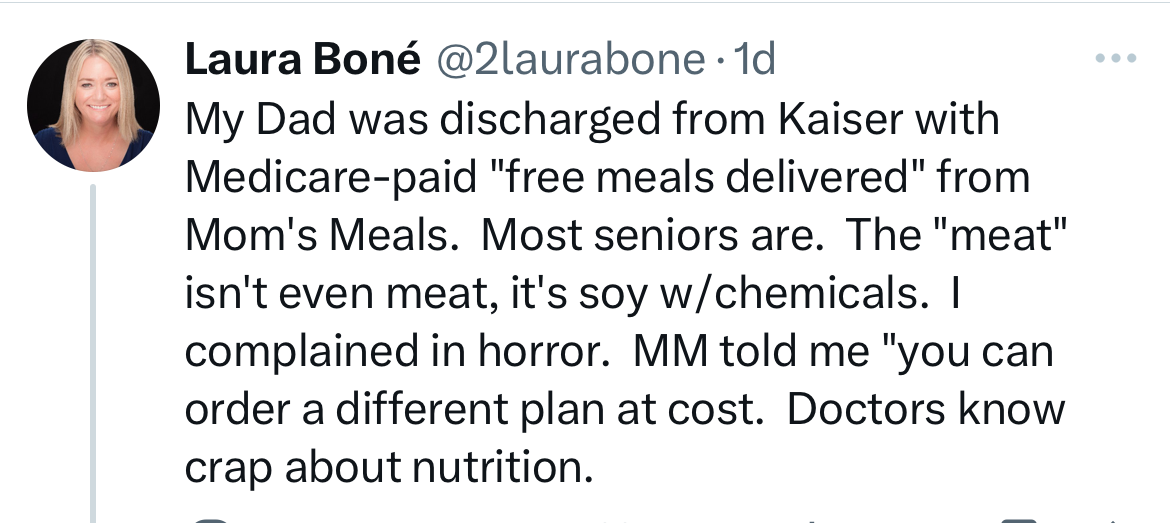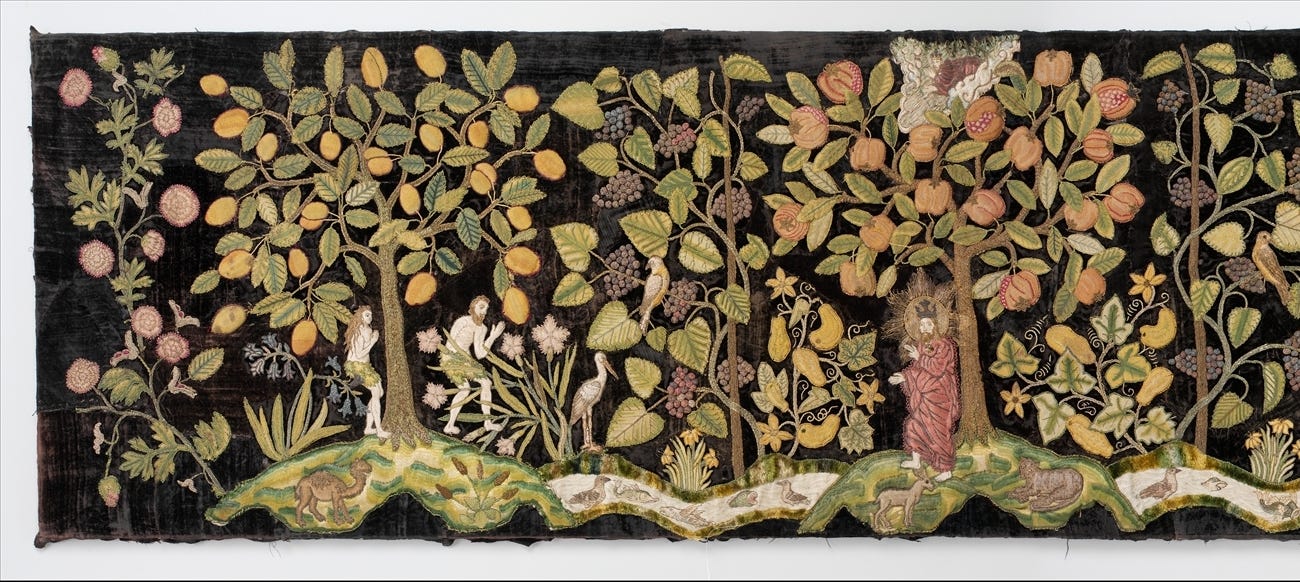There is a curious Twitter phenomenon where people answer questions that should not have an answer. You can find the discussion here. You cannot comprehend the horror of the question and the answers until you become the subject of the force feeding experiment to fatten you up. It is unclear what the purpose of it is. It may be that you are fattened up for slaughter.
There is some living and breathing person. It is a man or a woman who comes of some people, a place, and a tradition. Her or his life has some meaning. This person lived and ate all of his or her life some food to sustain him or her as well as give this person some pleasure from sharing meals with other people.1
If we determined that this person needed to gain weight — and it is a deliberation — it would make sense to begin formulating such a plan that the foods, not not-food, that we offer to this person are filling, nourishing, fit the tradition and custom that this person enjoyed all of his or her life.2 The foods would need to be enticing and fit the current state of the person based on some unknown conditions that we must determine before we recommend some way of thinking as to the selection of varied ways to help this person eat and enjoy one of the pleasures of living. When we need to sustain a person, we do not look for a substance. We look for the way. We do not look for what. We look for how.3
It is unclear if this person needs to be force fed to begin with. Why a physician prescribed an inedible concoction to the poor soul is hidden from us. If it is a dying person, force feeding him or her would amount to torture and deprive the person of the joy of having an appropriate meal, even a crumb or a drop of something pleasurable, in the company of people that care for this person.
If it is a person whose appetite was killed by the treatment of “cancer” and we are trying to fatten this person up to deliver a potentially lethal blow to a person to win the fight with cancer, we may want to consider if this is a wise decision, taking into consideration that we live now and not in the future, which may never come. Do you want to waste this day forcing some garbage into yourself for the purpose of “gaining weight” if you can enjoy whatever food that pleases you in the company of people that matter to you? What if this is your last meal? In any case, we must determine the circumstances of this particular person before proceeding with any plan.
Of course, there comes a question how the richest people in the world are the neediest when it comes to always lacking something that, apparently, government owes them. Why is the government feeding our mothers and fathers as if they were childless orphans? It should be horrifying that we are so disabled as a nation that none of us can cook a meal for our own parents and children.
Ivan Illich said that historically there were three groups of people who were fed: slaves, soldiers, and very destitute. Incidentally or coincidentally, rulers also force vaccinated the same groups of people to protect their slave-force and cannon fodder.
Why do people expect that government or physicians should know or tell you how to feed your family?4 Why is it easy to be “free and independent” when you are “healthy”? Why does everyone become needy and demanding when they are in pain or suffering somehow? What does it mean to be whole and healthy as a community of people?5 Does it have anything to do with government or healthcare making you dependent to such a degree that you cannot cook a meal, sneeze, care for the sick, or die without government assistance? What happened to the Land of the Free? Are we free?
Social iatrogenesis designates a category of etiology that encompasses many forms. It obtains when medical bureaucracy creates ill-health by increasing stress, by multiplying disabling dependence, by generating new painful needs, by lowering the levels of tolerance for discomfort or pain, by reducing the leeway that people are wont to concede to an individual when he suffers, and by abolishing even the right to self-care. Social iatrogenesis is at work when health care is turned into a standardized item, a staple; when all suffering is "hospitalized" and homes become inhospitable to birth, sickness, and death; when the language in which people could experience their bodies is turned into bureaucratic gobbledegook; or when suffering, mourning, and healing outside the patient role are labeled a form of deviance.
***
Most healing is a traditional way of consoling, caring, and comforting people while they heal, and most sick-care a form of tolerance extended to the afflicted. [Emphasis mine]. Only those cultures survive that provide a viable code that is adapted to a group's genetic make-up, to its history, to its environment, and to the peculiar challenges represented by competing groups of neighbors.
Ivan Illich. Medical Nemesis
Food Is Good
Some of us were born into the world where there was food. Food was good. It sustained all the people that came before us. We grew up knowing what food was. Where it came from. Where to find it. How to prepare it. How to eat it. When to eat it. What food goes together with other food. How it affects u…
If this person ate not-food all of his or her life, you will be under obligation to actually follow this tradition because you cannot begin to force this person to eat in a way this person never ate.
How is the essence of the scientific way of thinking by applying abstract knowledge to a particular situation to obtain a particular result in a way that is good and sensible, if possible, and is acceptable to the person whom you are trying to heal.
Doctor, what should I eat?
Have you included the metabolic deaths due to MDs lack of nutritional education? (Twitter)
Whose illness?
Modern Western tradition of illness is to submit or deposit a malfunctioning Body to a hospital for fix-up. The Body spends a lot of time unwatched in solitary isolation with occasional visitors - “healthcare providers” or family and friends. The Body is dev…







